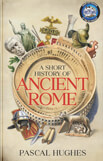Noiser
The History of Coffee
Play The Curious History of Your Home Coffee
The British might be known as a nation of tea drinkers, but over 80% of Brits buy coffee in their weekly shop. The story of how it became a central fixture of our lives involves dancing goats, capital punishments, and a man named George Washington.
Frolicking goats discover coffee
According to legend, an Ethiopian goatherd named Kaldi is said to have discovered the coffee plant in the 9th century.
The story goes that Kaldi was sitting under a tree, dozing. When he glanced up at the goats in his care, he was surprised by what he saw. They were prancing around like they didn’t have a care in the world. Most surprisingly, the dignified buck, typically a moody so-and-so, was joining in, too.
Kaldi was confused. What on earth had made his goats dance?
He watched as one animal wandered towards the trees that lined the clearing. It stood on its hind legs, reached towards a low branch, and tore off some of the red berries that glowed like jewels amongst the green leaves. Within moments, the goat was transformed, quickly joining the rest of the frolicking herd.
Eager to feel the effects for himself, Kaldi pulled a few berries from the tree and shoved them into his mouth. At first, he didn’t feel any different. But then, his blood started to buzz. A burst of energy rushed to his head, and before he knew it, he was in the middle of the field, dancing with abandon among his animals.
Soon after, a monk passed by. Surprised by what he saw in the field, he asked Kaldi about the dancing goats. Kaldi passed him some of the red berries and told the monk to try them out. Instead of eating them, the monk took them back to the monastery. In the kitchen, he crushed them and added boiling water. The first cup of coffee had been made!
The Pope v Satan v Coffee
In 1600, Pope Clement VIII was presented with a cup of coffee. Wild rumours had reached his advisors that the drink was being used in rituals by non-Christians in the Middle East. For Catholics to imbibe it would be to fall into a trap set by the Devil himself! His Holiness was urged to speak out against the drink, but Pope Clement refused to condemn the strange new beverage without at least trying it first.
Under his advisors’ watchful gazes, the Pope extended a hand and carefully raised the cup to his lips. As he took his first sip, his eyes widened in surprise. He took another, allowing the complex flavours to dance upon his tongue. With a sparkle of delight in his eyes, the Pope proclaimed: "This Satan’s drink is so delicious that it would be a pity to let the infidels have exclusive use of it!"
And with those words (or so it's told), coffee received the Catholic church’s blessing. Europeans could now enjoy this rich caffeinated beverage without fearing eternal damnation. 
Outlawed in Ottoman Istanbul
In the 16th century, coffeehouses began to spread throughout the Middle East. Men frequented them to talk, debate, watch performances, and play chess. Coffee houses were soon renowned for the enlightening discussions that flowed through them, earning them the nickname: ‘Schools of the Wise.’
Not everyone was a fan, though. In 1633, the Ottoman Sultan Murad IV banned the consumption of coffee in Istanbul. Publicly, Murad claimed that coffeehouses were a fire risk. But the truth was that he believed they were breeding grounds for dangerous philosophies - ideas born over a cup of coffee might come to threaten his rule.
To crack down on these potential threats, Murad declared the consumption of coffee a capital offence. Anyone caught with the stuff would be severely beaten. Repeat offenders would be put to death. It’s said that Murad sometimes even headed out into the city in disguise with his executioner in tow, ready to decapitate anyone he saw drinking coffee on the spot!
Did Founding Father George Washington invent instant coffee?
Well, no. He didn’t. But another George Washington did! He was a Belgian-born chemist, and it’s he we have to thank for the express beverage.
In 1909, Washington dehydrated coffee beans, reducing them to a hard, dry substance. Then, he ground the beans into a fine powder and found that they dissolved quickly when mixed with boiling water, instantly creating a cup of coffee. When the US entered World War I in 1917, the American government bought as much of Washington's instant coffee as possible, ready to distribute it to their boys fighting in the trenches. And they dubbed George Washington ‘the soldier’s friend’ for providing them with the coffee that gave them a much-needed taste of home.
After all these years, coffee is still one of the most popular drinks. Every year, people worldwide drink a staggering 400 billion cups of the stuff. So, next time you pop a pod into your home coffee machine or pour yourself a cup of instant in your favourite mug, why not stop for a moment and consider just how much history is contained within a simple cup of coffee? Or better yet, do all that while listening to the episode!
